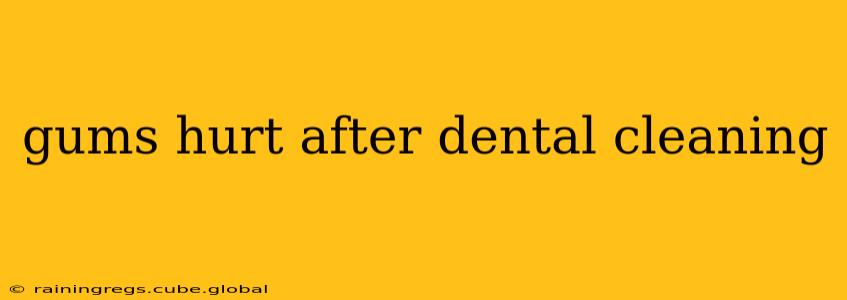Having your teeth cleaned professionally is crucial for maintaining good oral health. However, many people experience some discomfort, and sometimes even pain, in their gums afterward. This is a common issue, but understanding the causes, how to manage the pain, and steps for preventing future discomfort is key. This article will address these concerns and answer frequently asked questions surrounding this experience.
Why Do My Gums Hurt After a Dental Cleaning?
The most common reason for gum soreness after a dental cleaning is inflammation. During the cleaning, your hygienist uses specialized tools to remove plaque and tartar buildup from your teeth and along the gum line. This process, while necessary, can irritate already inflamed gums, leading to increased sensitivity and pain. The inflammation is often a sign of underlying gum disease (gingivitis or periodontitis), even if it hasn't been previously diagnosed. The cleaning process itself can temporarily worsen existing inflammation, causing noticeable pain.
Another potential contributor is aggressive cleaning. While a thorough cleaning is essential, overly vigorous brushing or scaling can also traumatize the gums, resulting in soreness. This is less common with experienced and well-trained hygienists, but it's still a possibility.
How Long Does Gum Soreness After a Cleaning Last?
The duration of gum soreness varies from person to person. For most, the discomfort subsides within 24 to 48 hours. However, some individuals may experience mild sensitivity for up to a week. If the pain persists for longer than a week or worsens, it's crucial to contact your dentist. Prolonged or severe pain could indicate a more serious underlying dental problem.
What Can I Do to Relieve Gum Pain After a Cleaning?
Several home remedies can help soothe sore gums after a dental cleaning:
-
Saltwater Rinse: Dissolve ½ to ¾ teaspoon of salt in a glass of warm water. Gently swish the solution around your mouth for 30 to 60 seconds, then spit it out. Repeat several times a day. The salt water helps reduce inflammation and cleanse the area.
-
Over-the-counter pain relievers: Ibuprofen or acetaminophen can help alleviate pain and reduce inflammation. Always follow the dosage instructions on the packaging.
-
Cold compress: Applying a cold compress to your cheek can help numb the area and reduce swelling.
-
Gentle brushing and flossing: Continue brushing and flossing, but do so gently to avoid further irritation.
-
Avoid irritants: For a day or two after the cleaning, avoid foods and drinks that are too hot, too cold, or acidic, as these can exacerbate the sensitivity.
Is it Normal for Gums to Bleed After a Dental Cleaning?
A small amount of bleeding during or immediately after a dental cleaning is not unusual, especially if you have gingivitis. However, excessive or prolonged bleeding is not normal and should be reported to your dentist. Bleeding gums often signify underlying gum disease that requires attention.
How Can I Prevent Gum Soreness After Future Dental Cleanings?
Practicing good oral hygiene at home is the best way to prevent gum soreness after cleanings. This includes:
-
Brushing twice a day: Use a soft-bristled toothbrush and gentle, circular motions.
-
Flossing daily: This removes plaque and food particles from between your teeth where your toothbrush can't reach.
-
Regular dental checkups and cleanings: Visiting your dentist for professional cleanings every six months is vital for maintaining optimal oral health and preventing gum disease.
-
Maintaining a healthy diet: A balanced diet supports overall health, including gum health.
What if my gums are still hurting after a week?
If your gum pain persists for more than a week after your cleaning, it is essential to contact your dentist. This could indicate a more significant issue, such as an infection or an undiagnosed gum disease that needs further evaluation and treatment. Don't hesitate to seek professional help if you're experiencing persistent pain or discomfort.
By understanding the causes of post-cleaning gum soreness, employing effective remedies, and prioritizing preventive measures, you can significantly reduce discomfort and maintain healthy gums. Remember, regular dental check-ups and good oral hygiene are key to a healthy and happy smile!
